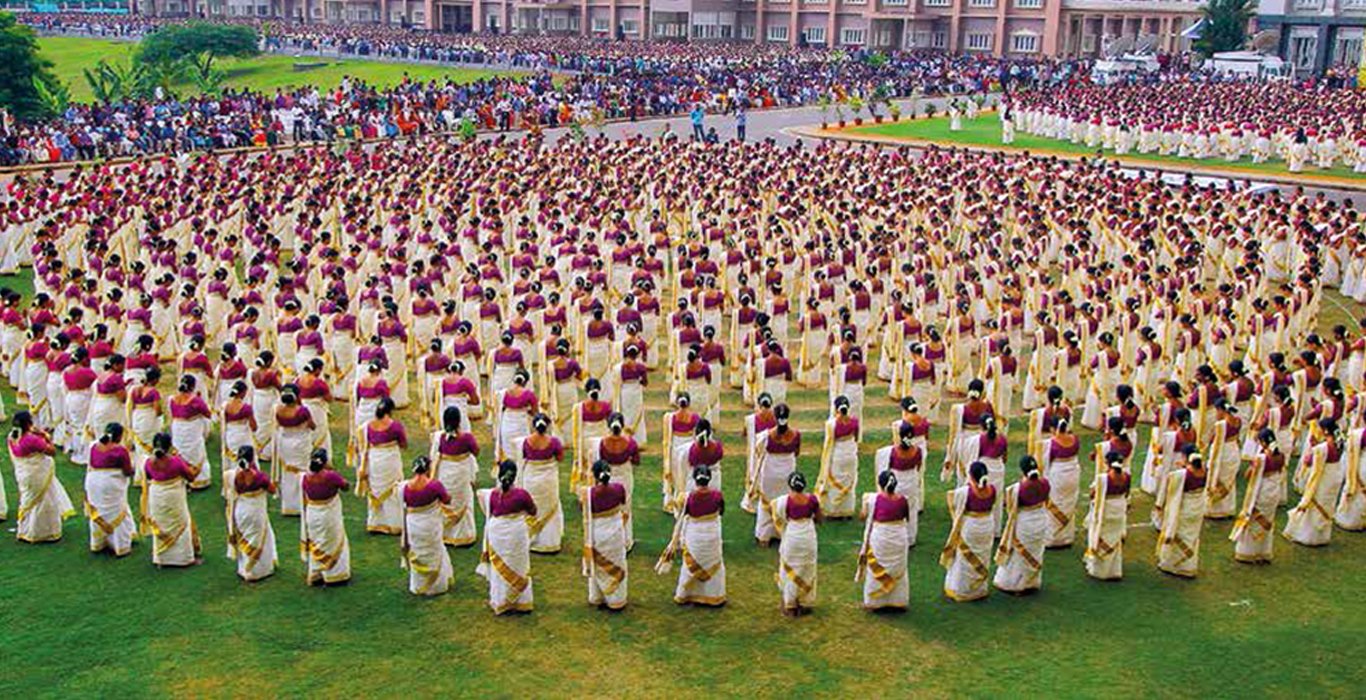A Pristine Celebration of Womanhood
Text: Keerthy Ramachandran
On a bright full moon night, as the cold breeze of the month of Dhanu (a Malayalam month which as per Gregorian calendar falls in December- January) gently blows through the vil lages of Kerala, it is not hard to hear hushed songs float by. Listen closer and you might hear “Kaithozham Krishna” or Parvanendu mukhi” as women dance with the perfect blend of rhythm and grace till the break of the dawn. Enrobed in golden bordered kasavu sarees, with the dashapushpam (the ten sacred flowers) adorned in their loosely tied hair, they slip into a magical trance as they perform one of the most ancient and ethereal dance forms of Kerala, the thiruvathirakali.
Thiruvathirakali is a ritualistic dance performed on the auspicious day of Thiruvathira which falls in the month of Dhanu, celebrated as the birthday of Lord Shiva. Considered to be one of the early forms of recreational activities women used to enjoy right from the conservative days of the Kerala culture, the dance form takes the name of Onakali when performed during the Onam celebration.
Thiruvathirakali ,Onakali or Kaikottikali as it is popularly known, is performed by maiden girls to evoke the blessings of Lord Shiva to secure a ‘loving husband’ and by married women seeking eternal marital bliss. Decades ago, when an eighth standard student brought to the stage her passion for thiruvathirakali by making an exceptional performance on her school day celebration, little did she know she would win a ‘loving husband’ right at the venue itself! 86 years old Smt Malathy G Menon, fondly known as Thiruvathira Muthashi (Thiruvathira Grandmother), found the love of her life in that school audience and got married the same year, to the man who fell for her graceful performance.Today, this octogenarian is on a mission to popularize the dance form in every corner of the nation. Bagging 3 world and national records including the Guinness World Records and Limca Book of Records for conducting mega thiruvathirakali performances, Malathy teacher (as she is referred to) has students in the age group of 9 to 90 years, learning thiruvathirakali from different parts of the country. In 2009, she established Parvanendu School of Thiruvathira in Ernakulam, a dedicated institute to teach thiruvathirakali for those who wants to get themselves trained in one of the oldest dance forms of Kerala, in its original style.

“Thiruvathirakali is in my breath. From the age of three I have been Thiruvathirakali is in my breath. From the age of three, I have been dancing thiruvathirakali with my mother, aunts and grandmothers. Today, it gives me a great
sense of complacency to see the tradition remaining alive when I see my daughter and grandchildren also following the steps, abiding by the discipline the art form demands dancing thiruvathirakali with my mother, aunts and
grandmothers. Today, it gives me a great sense of complacency to see the tradition remaining alive when I see my daughter and grandchildren also following the steps, abiding by the discipline the art form demands,” says a vivacious Malathy teacher who obviously loves to talk a lot. She remembers Thiruvathira as a joyous festival of women which celebrates their ebullience and sense of freedom. Women observe fast a day before Thiruvathira by
completely abstaining from eating rice in any form. On the Thiruvathira day, they wake up early in the morning; bathe in pond in groups, playing and singing together, a ritual followed even today as ‘thudichu kuli.’ After the bath, they visit a Shiva temple and then in the spacious nadumuttam, inner court yard of the naalukettu (a traditional Kerala homestead),they dance in mirth till early morning.
 Imparting the goodness of these traditional rituals to the city dwellers of Ernakulam, every year Malathy teacher leads the Thiruvathira celebrations conducted by Ernakulam Karayogam. “The good vibes such celebrations bring to our lives should not be lost in time and therefore I take ardent interest in promoting the spirit of Thiruvathira among everyone,” she says. The first Thiruvathira after wedding is observed as “Poothiruvathira” and the newly married women are therefore given great importance during the Thiruvathira celebration. The danseuse slips into a different world of nostalgia as she beautifully sings and explains the different songs sung during every stage of the celebration. There are designated songs to be sung while walking to the pond to take bath, during the bath time, after that etc.and the best part is, most great grandmothers of Malathy teacher’s age would still remember every line of these songs.
Imparting the goodness of these traditional rituals to the city dwellers of Ernakulam, every year Malathy teacher leads the Thiruvathira celebrations conducted by Ernakulam Karayogam. “The good vibes such celebrations bring to our lives should not be lost in time and therefore I take ardent interest in promoting the spirit of Thiruvathira among everyone,” she says. The first Thiruvathira after wedding is observed as “Poothiruvathira” and the newly married women are therefore given great importance during the Thiruvathira celebration. The danseuse slips into a different world of nostalgia as she beautifully sings and explains the different songs sung during every stage of the celebration. There are designated songs to be sung while walking to the pond to take bath, during the bath time, after that etc.and the best part is, most great grandmothers of Malathy teacher’s age would still remember every line of these songs.
“The festivity and enthusiasm Thiruvathira brings to the minds of women in Kerala is truly special. I don’t like to see the spirit being restricted to the Hindu women of Kerala. I have therefore dedicated my life to spread the charisma of this culture to every woman in this country,” she affirms. But the confidence and enthusiasm of Malathy teacher to take thiruvathirakali to every household is such that, she recently taught thiruvathirakali to a group of men who wanted to learn the dance. “No rules and defined systems should inhibit one to learn an art form. It is true women’s grace bring to fore the charm of thiruvathirakali, but I have male students who surpass women in their elegant moves,” she beams. After winning a Guinness record for conducting a mega thiruvathirakali event with 6,582 women, Malathy teacher is willing to hit the next record with men if they willingly step forward.
Creating historical milestones with thiruvathirakali is Malathy teacher’s way to bring the art form to the global map. She says, “I want everyone to dance thiruvathirakali. It is perhaps one of the simplest dance forms anyone can shake their leg to. All that you need is an interest to learn and a sense of rhythm.” She is a proud recipient of ‘Vanitaratna’ award conferred recently by Women and Child Welfare Department, Government of Kerala. She has also won the Lifetime Achievement Award by the Indian Information Guidance Society, Baba Ambedkar Award and fellowship and “Kalaratna” award from Art & Cultural Society among others for her significant contributions to the world of thiruvathirakali.
Interestingly, Malathy teacher’s recognition doesn’t confine to the world of thiruvathirakali. Her incessant energy and unrelenting commitment to learn new forms of art keeps her going. At the age of 75, she learnt and performed Kathakali and Idakka (a percussion instrument). At 80, she mastered Chenda and Keyboard. Drums have caught her latest fascination. Neither age nor health stands in her way. Life is nothing less than a celebration; truly this muthashi is a personification of the spirit of the thiruvathirakali.
I want everyone to dance thiruvathirakali. It is perhaps one of the simplest dance forms anyone can shake their legs to. All that you need is an interest to learn and a sense of rhythm



